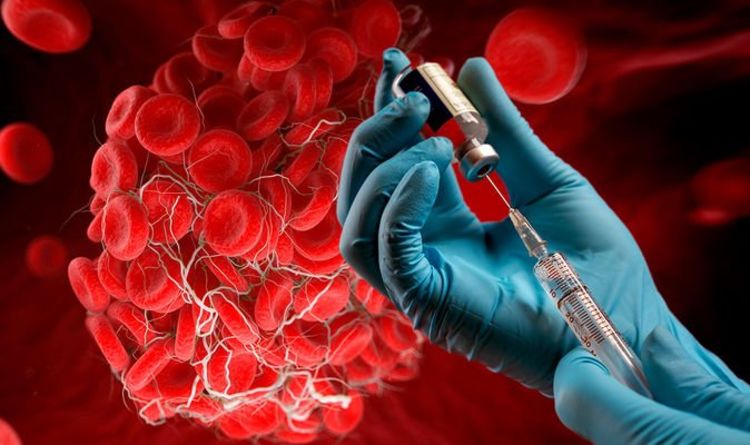AstraZeneca vaccine: If I develop a blood clot, what are my chances of dying?

The UK’s world-beating vaccination campaign owes in large part to AstraZeneca’s coronavirus vaccine. The UK manufactured it at home and signed contracts early on with the British-Swedish company to ensure ample doses for its citizens. Despite being integral to the vaccination effort, reports that link the vaccine to the development of blood clots have been a blot on its record.
What are the chances of fatality if I develop a blood clot?
Even if the AstraZeneca vaccine is proven to be the cause of the clots, the rate of death is extremely low.
As the British Heart Foundation reports (BHF), the rate of death is about one in every 400,000 people vaccinated.
“This needs to be balanced with the known risks of coronavirus causing serious illness (with complications that can include blood clots) and death,” notes the BHF.
The health body adds: “The risks of not having the vaccine are much greater than any risks of having it, for you as well as for those around you.”
DON’T MISS
Vitamin B12: Two indications in the feet [INSIGHT]
Diabetes type 2: Four types of pain to spot [ADVICE]
Visceral fat: The simple drink you can make [TIPS]
Who is mostly affected?
The rare blood clot condition is seen more often in younger people and tends to occur between four days and four weeks following vaccination, reports PHE.
In light of the increased risk, the Joint Committee on Vaccination and Immunisation (JCVI) – the body prioritising the rollout – has advised that it is preferable for people in this age group to have a vaccine other than AstraZeneca.
The thinking is based on the understanding that you are more at risk of the serious consequences of COVID-19 and will have the most benefit from being vaccinated if you are older, male, from certain minority ethnic backgrounds, in some occupations, or are obese.
Nonetheless, if you receive the vaccine and develop concerning side effects, you should seek medical advice urgently.
According to the NHS, serious reactions include:
- A new, severe headache which is not helped by usual painkillers or is getting worse
- A headache which seems worse when lying down or bending over
- An unusual headache that may be accompanied by blurred vision, nausea and vomiting
- Difficulty with your speech
- Weakness, drowsiness or seizures
- New, unexplained pinprick bruising or bleeding
- Shortness of breath, chest pain, leg swelling or persistent abdominal pain.
These adverse effects may show up between four days and four weeks post-vaccination, explains the health body.
It is important to note that the COVID-19 vaccines approved for use in the UK have met strict standards of safety, quality and effectiveness.
They can cause some side effects, but not everyone gets them.
The data indicates that any side effects are usually mild and should not last longer than a week.
Am I eligible to receive a coronavirus vaccine?
You can get the COVID-19 vaccine if:
- You’re aged 30 or over
- You’ll turn 30 before 1 July 2021.
You can book appointments at a larger vaccination centre or pharmacy now, or wait to be invited to go to a local NHS service.
If you are not eligible yet, wait to be contacted.





